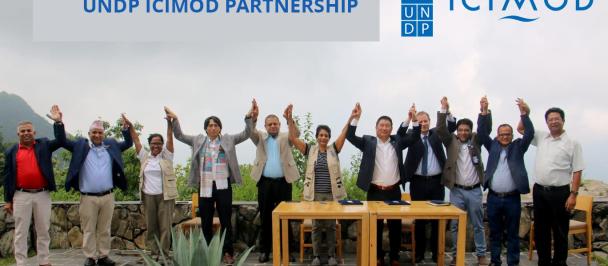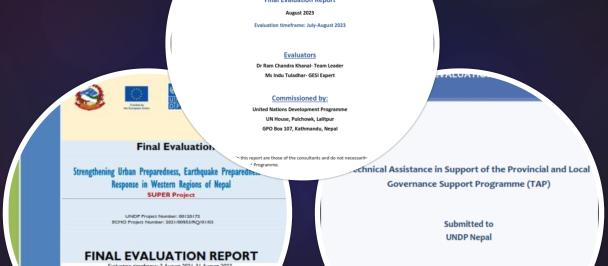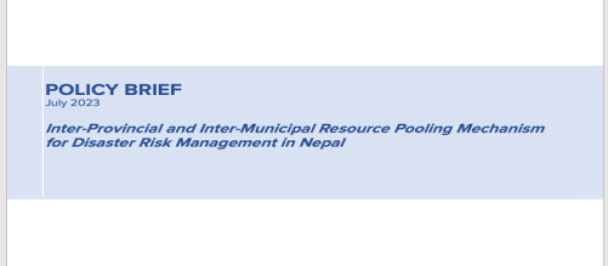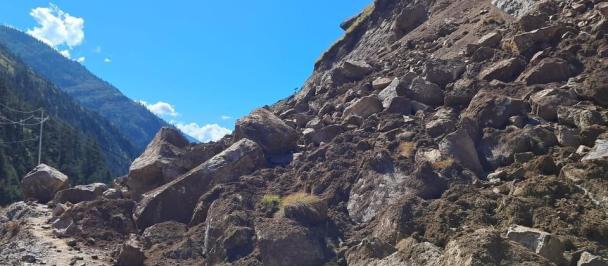UNDP's Strategic Plan 2018-2021 sets out the direction for a new UNDP, optimized to help countries achieve the 2030 Agenda for Sustainable Development. The Plan describes how UNDP will better adapt to the range of country contexts in which we work, part of which is a series of signature solutions that define the core work of UNDP.
Biodiversity and terrestrial and marine ecosystems provide the foundation for human societies and a safety net of resources and ecosystem services for billions of people. UNDP will apply integrated actions developed in partnership with FAO, UNEP and others to address biodiversity loss by tackling market, policy and governance failures that lead to ecosystem degradation. These actions will build on existing partnerships with these agencies including for instance through the Global Environment Facility, the Poverty-Environment Initiative and the United Nations Collaborative Programme on Reducing Emissions from Deforestation and Forest Degradation in Developing Countries. Furthermore, addressing finance, tenure, water and land rights, with a clear understanding of the differentiated impacts, access and contributions of women and men and also of indigenous communities will be critical. In some development contexts, strengthened ecosystem management and nature-based solutions can help achieve food and water security and sustainable livelihoods. In other contexts, this signature solution will help Governments to identify and access new financing opportunities, promote policy coherence on natural resources and help transitions to green economies. In the aftermath of crises, this signature solution can assist with sustainable recovery efforts protecting natural resources, biodiversity and ecosystems.
Preserving Phewa
The radiant Phewa Lake is the jewel of the city of Pokhara, a vital natural resource that supports the livelihoods of thousands of people living on its periphery and an attraction for the thousands of tourists who visit this lake-city. In recent years, however, Phewa Lake has been shrinking rapidly — by more than half over the past 50 years — as a result of increasing sedimentation caused by unsustainable land use practices, haphazard construction (mostly of roads) and deforestation in the lake’s upstream catchment area.
Studies show that the lake’s shrinkage has resulted in a sharp decline in the lake’s ecosystem and biological diversity. But the primary reason for the damage to the lake’s flora and fauna has resulted from increased water pollution from the uncontrolled flow of contaminated water into the lake from the hills and surrounding urban areas. Against such environmental odds, UNDP, in collaboration with the Government of Nepal, UNEP and IUCN, has been working with local communities in Panchase (including the Phewa catchment area) on an Ecosystem-based Adaption (EbA) programme to address challenges and mitigate the climate risks faced by the ecosystem and vulnerable communities. READ MORE
Parched no more
The Global Environment Facility’s Small Grants Programme (GEF-SGP) had worked with the Centre for Rural Technology Nepal (CRT/N) to install four units of hydraulic rams or hydrams—essentially an automatic water-pumping device—in Balthali. The funds were supported through Every Drop Matters—a joint initiative of UNDP and the Coca Cola company geared towards water conservation.
What makes the hydram so appropriate for higher-altitude areas such as this one is that no external energy is required to run it, according to Santosh Mandal, an engineer from CRT/N. “Hydrams use a large volume of water falling through a small head to lift a small amount of that water to a much greater height,” he says. A four-inch hydram can lift water to a height of 100 meters, and pump out 25,000 liters in 24 hours. In Balthali, the water has been collected in an overhead tank situated at a height above 76 meters, and is being used to irrigate three hectares of land belonging to 25 households. READ MORE
When water comes home
With funding from the UK’s Department for International Development (DFID) and the European Union, the Nepal Climate Change Support Programme launched a drinking water pipeline expansion project in Gadhwa, Dang, linking all 65 households in the area with water taps connected via pipelines to the Katahiya station. For four hours a day now, these households are supplied with drinking water.
“It’s changed everything,” Jamuna, a local, says. “I have access to water when I need it; I don’t have to walk to fetch it anymore.” The tap has also enabled her to spend more time at her shop, earn more from sales, and she has even started growing her own vegetables. READ MORE

 Locations
Locations





